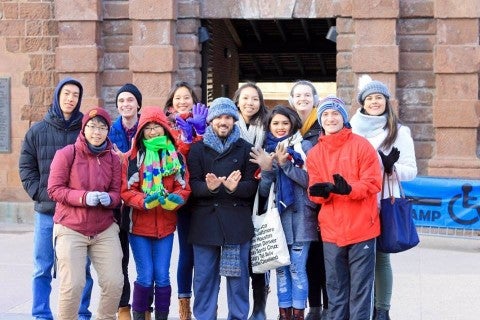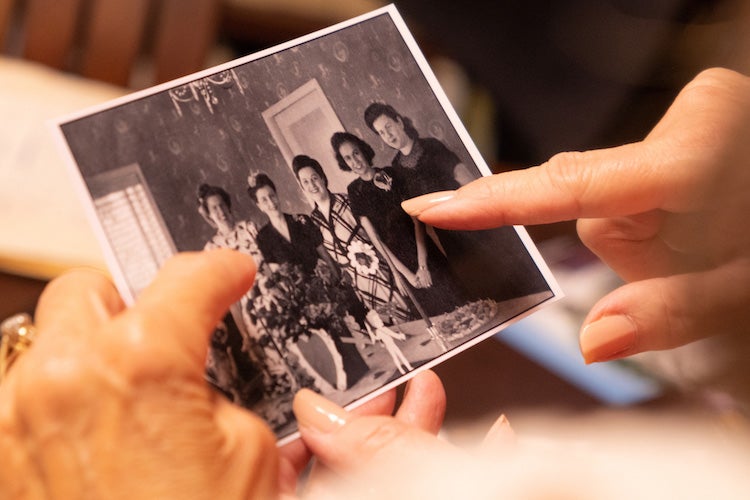This is a really exciting moment … we're beginning to change the way that Texas Jewish history is preserved and studied.
Joshua Furman’s path to building the Houston Jewish History Archive was more serendipitous than deliberate. As the Stanford and Joan Alexander Postdoctoral Fellow in the Program in Jewish Studies, his interest in researching local Jewish history arose in 2016 as he was preparing to give a lecture on the history of Meyerland, a historically Jewish neighborhood in southwest Houston.
“I discovered that there was a considerable gap in terms of available resources on Houston Jewish history,” he recalls. “Nobody had really written a scholarly book on the subject, and relative to other Jewish communities in the United States, Houston had not been receiving any attention.” Based on his findings, Furman decided to begin conducting research for a book on the history of Houston’s Jews. Yet, what began as an idea to compose oral histories of Houston’s Jewish residents was suddenly transformed into a passion for rescuing and preserving local Jewish history in the wake of Hurricane Harvey.
In the days after the 2017 storm that devastated Houston, Furman was struck with the urgency to save historical documents that were at risk of disappearing forever. He and Rice’s centennial historian Melissa Kean waded into severely damaged synagogue basements, and eventually private local homes, to salvage irreplaceable artifacts such as photographs, cemetery maps and synagogue membership directories. “With that kind of stuff, there's only one copy of it in the world.
“I didn't have the first clue about how to preserve wet, moldy, damaged documents, just a deep desire to do something to make a difference,” says Furman, who today is curator of the archive.
With support from the Fondren Library’s Woodson Research Center and a grant from the Stanford and Joan Alexander Foundation, Furman’s preservation initiative has quickly grown into a much sought-after intellectual hub for studying Jewish culture and life in Texas.
The archive has amassed 150 linear feet of material in just two years of existence, according to Woodson Research Center archivist Traci Patterson. Varying in size, from a rare pamphlet that sheds new light on the Galveston Movement to a trove of 30 banker’s boxes, each collection gives scholars glimpses into Jewish life in southeast Texas from the 1880s to the present. Undergraduate student interns, through a program made possible by generous gifts from the Edith and Bernard Stolbun Family Foundation, have processed and digitized the archive’s ever-growing volume of historical documents, photographs and ephemera acquired from Jewish communities from across the region.
Today, Furman continues to expand the archive, acquiring materials from a variety of sources both in Houston and across South Texas. By highlighting the project to a number of groups across Houston — including audiences at the Evelyn Rubenstein Jewish Community Center of Houston and area synagogues, where Furman is a frequent presenter — word of the archive has spread.
"This is a really exciting moment … we're beginning to change the way that Texas Jewish history is preserved and studied," he says.
The community’s engagement and support for the archive has been enthusiastic, according to Furman. In February, project archivist and recent Rice graduate Katie Webber (Martel College Class of 2019) joined Furman at Congregation Beth Israel on the Jewish Community Day of Learning, Yom Limmud, where the two hosted a booth for the archive and presented materials for visitors to observe. Webber recalls one woman brought to tears when she discovered several photos of her family members when looking through yearbooks at the booth. The most popular item with the crowd was a large sign from Belden’s, a recently shuttered Jewish-owned grocery store,a beloved fixture of the Meyerland neighborhood.
“Communities are constantly changing — what the institutions look like and what businesses look like,” says Webber. “And for those communities to be able to see and connect with something that isn't there anymore, it’s obviously very important to them.”
For Nancy Pryzant Picus, a member of the local Jewish community with Houstonian roots stretching back over a century, the Houston Jewish History Archive serves not only as a treasure trove of family genealogies but also a testament to the community’s perseverance in the face of hardship. “The 2015 Memorial Day flood, the 2016 Tax Day flood and Hurricane Harvey, in particular, affected the Jewish community near Meyerland. Harvey also wreaked havoc on the Jewish community that settled in Bellaire. This community has been very resilient and I believe that one of the good things to come out of Harvey is the archive.”
The retired Jewish educator has volunteered in collection processing at the archive since the summer of 2018, where she has discovered connections to her family and community popping up, from a photograph of her parents planting grass at Congregation Emanu El in the late 1940s, to works from her late former teacher, Shirley Barish, an influential local Jewish educator.
By helping to preserve the history of Houston families like hers, Pryzant Picus feels she’s contributing to a historical project that she says has been noticeably absent from the city she calls home. “Houstonians have looked to the future more than to the past. Just by virtue of things like flooding, we have to keep reestablishing our history and we have to keep reestablishing ourselves. I'm so grateful to be part of such an important work, and I do it as much for my own enjoyment as for my own sense of purpose.”
With the onset of the COVID-19 pandemic and the closure of Fondren Library, the archive shifted its operations to a remote format. However, the HJHA is now documenting Houston’s Jewish history as it unfolds by collecting materials that reveal the myriad ways in which Jewish life and worship has changed under lockdown. From virtual synagogue services to Zoom interviews with local community members, the archive plans to digitally publish new archival materials related to COVID-19.


